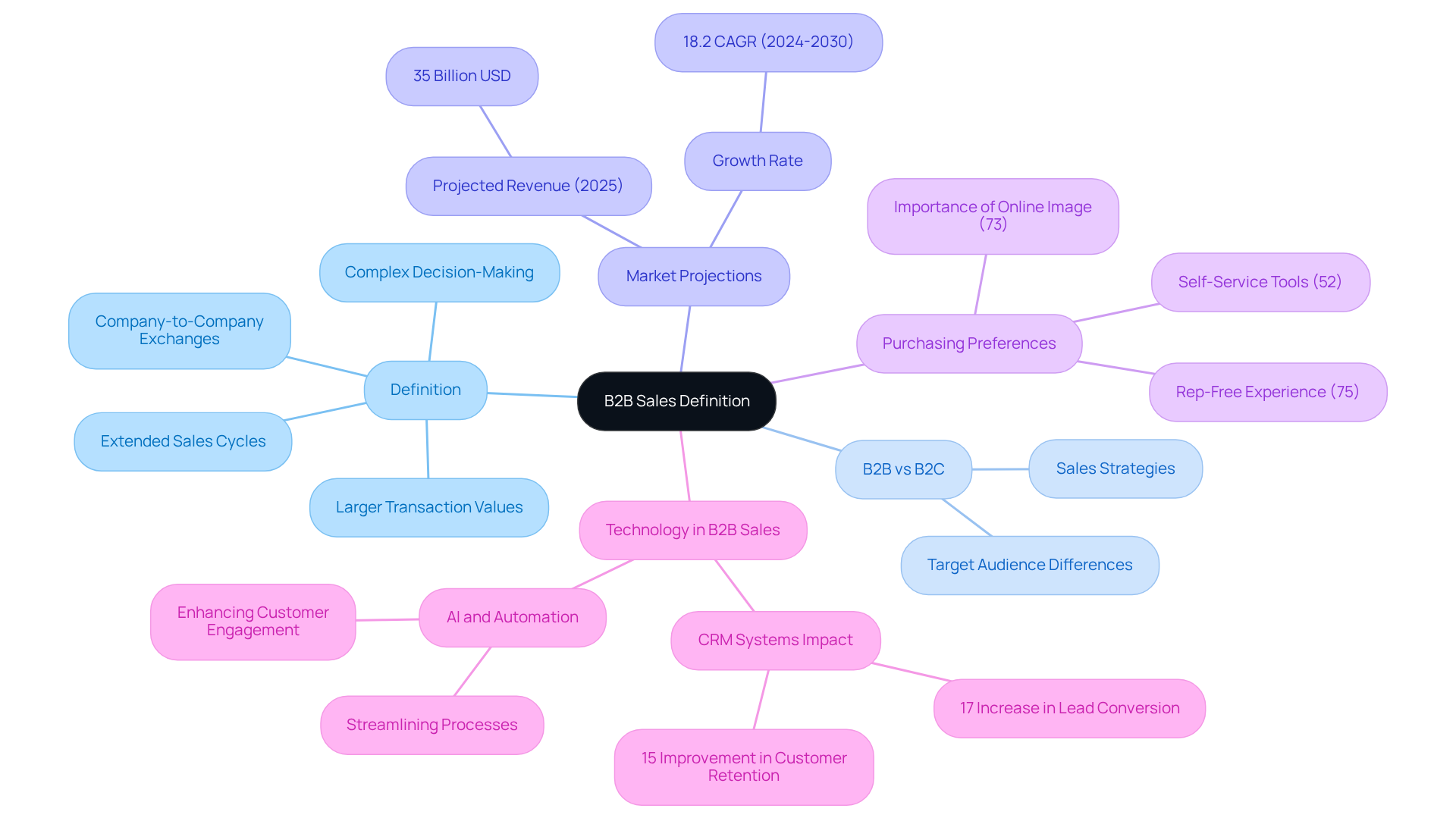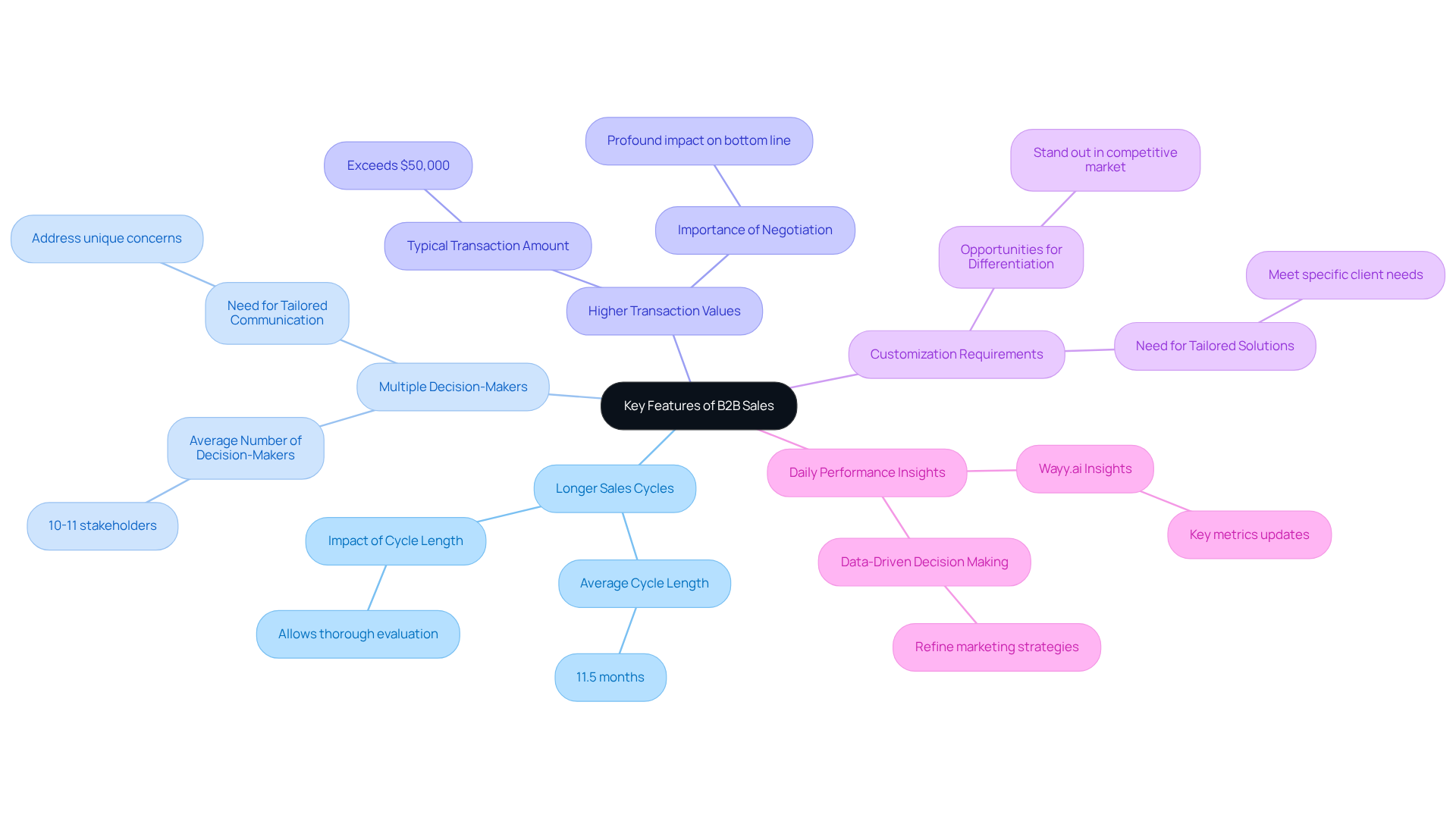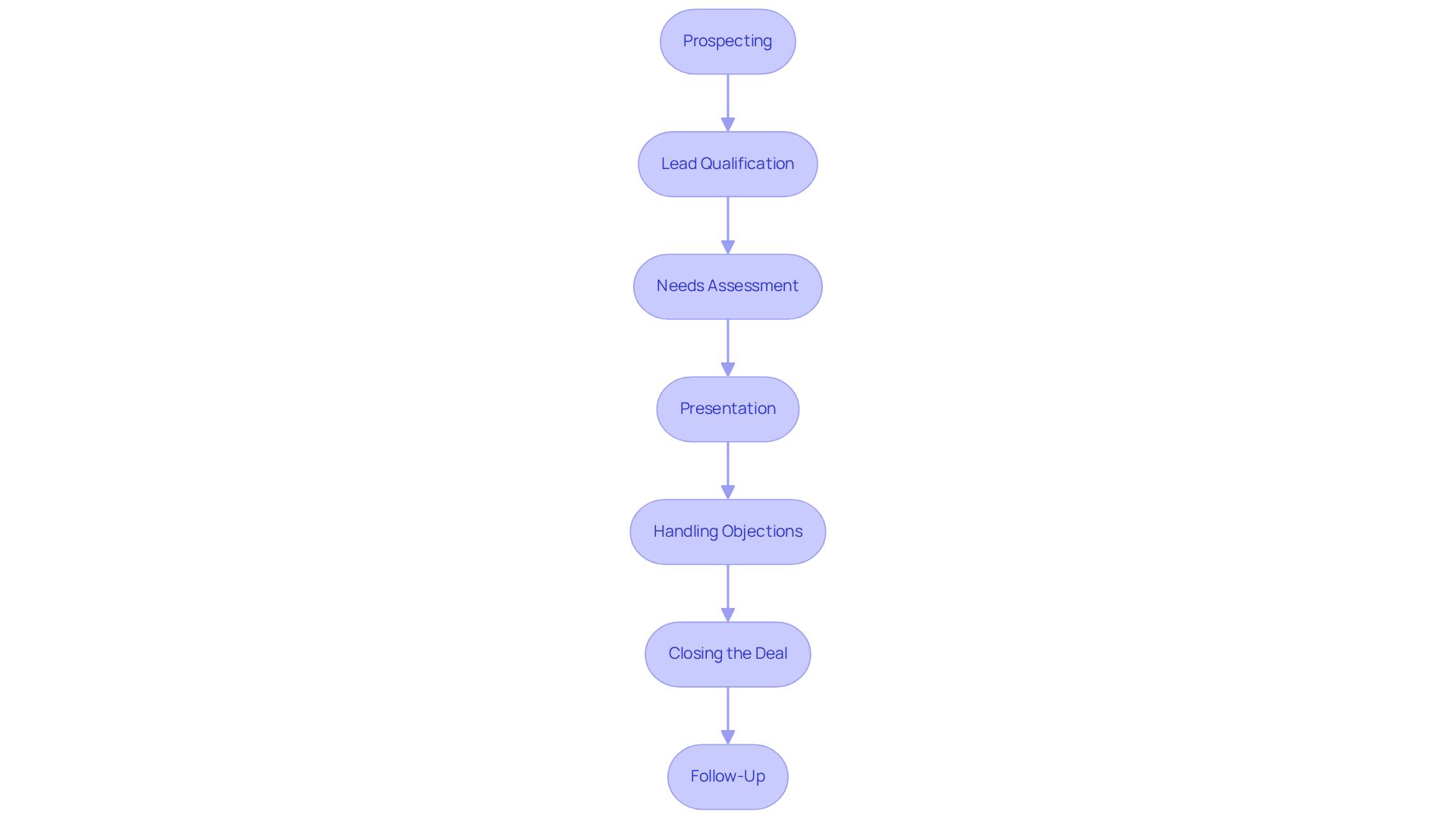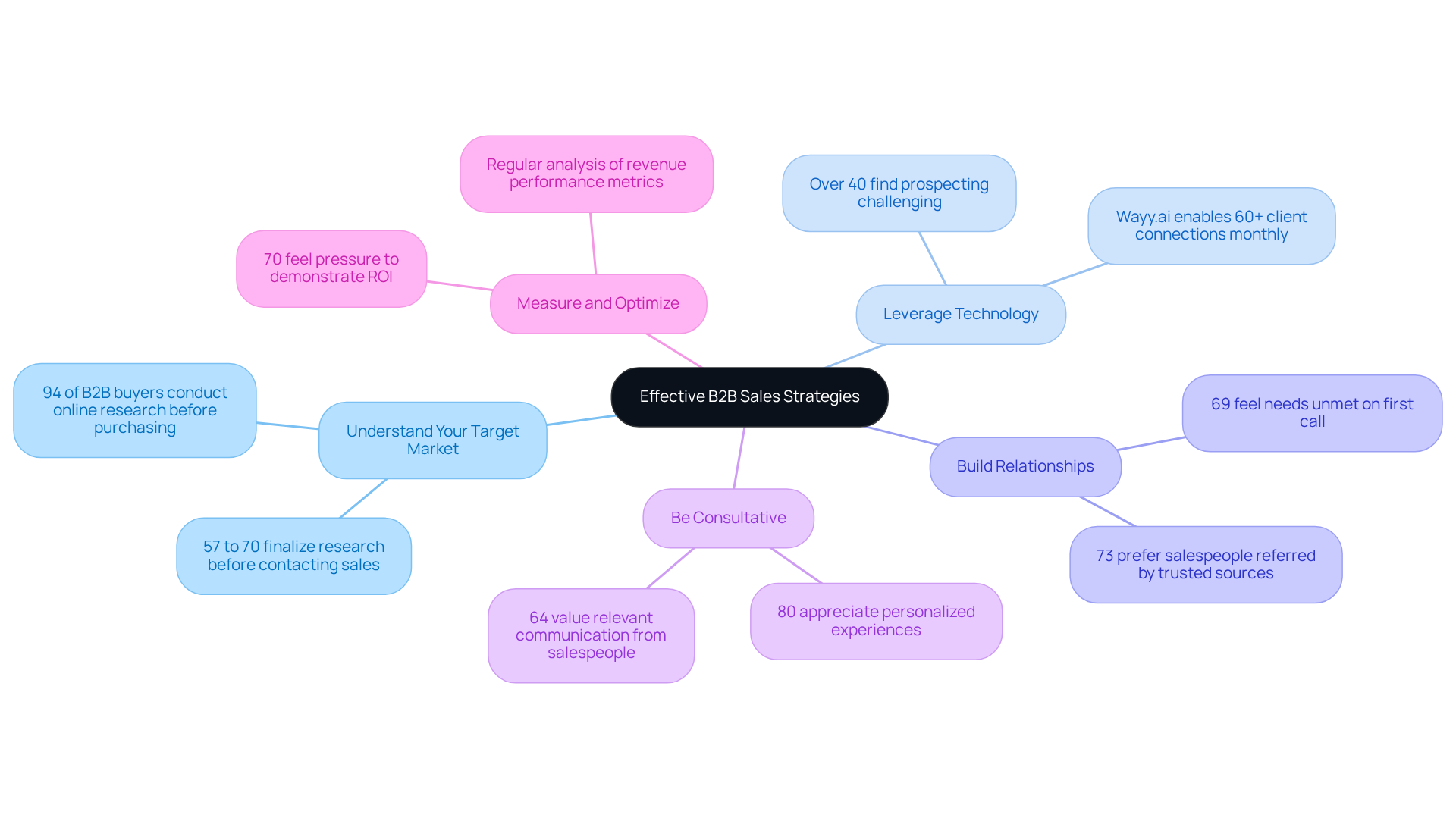Overview
B2B sales, which involve transactions between companies, can often feel overwhelming. These processes are typically more complex, characterized by longer sales cycles, multiple decision-makers, and higher transaction values compared to B2C sales. It's important to recognize that you're not alone in navigating these challenges. Successful B2B sales strategies can truly make a difference, especially when they leverage technology and focus on building strong relationships.
By utilizing data-driven insights and tailored communication, businesses have seen improved lead conversion and customer retention. Have you considered how technology could enhance your sales approach? Remember, the right tools can empower you to connect more effectively with your clients, making the sales process smoother and more rewarding.
Ultimately, embracing these strategies allows you to navigate the complexities of B2B sales with confidence. Together, we can achieve success by understanding and addressing your unique challenges in this landscape.
Introduction
Understanding the intricacies of B2B sales is not just important; it’s essential for small business owners navigating a marketplace poised for exponential growth. With projections indicating nearly $35 billion in e-commerce revenue by 2025, we recognize the immense potential that lies ahead.
This article delves into the defining features of B2B transactions, shedding light on the unique challenges and opportunities you may face in this arena. As the landscape shifts towards self-service and digital interactions, how can you adapt your strategies to not only survive but truly thrive in this competitive environment?
Together, let’s explore these important questions and find ways to empower your business for success.
Define B2B Sales: Understanding the Basics
The [b2b sales definition](https://wayy.ai/demo) describes B2B transactions as company-to-company exchanges where one entity offers products or services to another. This model differs significantly from B2C (business-to-consumer) transactions, where companies aim at individual consumers. B2B transactions typically feature larger transaction values, extended cycles, and a more intricate decision-making process, often requiring input from multiple stakeholders. In 2025, the B2B e-commerce revenue for physical goods is projected to reach nearly 35 billion U.S. dollars, highlighting the growing significance of this market.
Understanding the nuances of B2B transactions is essential for small business owners who want to grasp the and enhance their selling strategies. For instance, firms that implement hybrid revenue models can experience up to 50% greater income growth compared to those relying solely on traditional methods. Additionally, 75% of B2B purchasers now prefer a rep-free purchasing experience, indicating a shift towards self-service and digital interaction.
Successful strategies in B2B sales often harness technology and data-driven insights, which are key components of the b2b sales definition. For example, organizations using CRM systems report a 17% increase in lead conversion and a 15% improvement in customer retention. With Wayy, small business owners can benefit from daily email insights that track key metrics like leads reached, interest shown, and conversion rates. The one-click transaction playbook and targeted outreach capabilities of Wayy.ai further enhance these strategies, enabling companies to close deals more efficiently. Case studies reveal that businesses leveraging technology for transactions can secure agreements more effectively, with top performers generating 46% more revenue.
For small business owners, understanding the dynamics of B2B transactions, according to the b2b sales definition, not only enhances their ability to connect with other enterprises but also positions them to capitalize on emerging trends and technologies, ultimately fostering growth and success. However, navigating challenges in lead generation and effective outreach remains critical in the B2B landscape. Together, we can explore these strategies and empower your business to thrive.

Explore Key Features of B2B Sales
Key features of B2B sales are essential for understanding your journey in this complex landscape:
- Longer Sales Cycles: Did you know that the typical B2B buying cycle spans approximately 11.5 months? This duration is significantly longer than B2C transactions, often due to the intricate nature of products and services. It’s important to recognize that this extended timeline allows for thorough evaluation and consensus among stakeholders, ensuring that every decision is well-informed.
- Multiple Decision-Makers: According to the B2B sales definition, there are usually around 10-11 decision-makers involved in B2B transactions, each bringing unique concerns and priorities to the table. This complexity highlights the need for tailored communication strategies that resonate with all stakeholders, ensuring that everyone feels heard and valued throughout the purchasing process.
The B2B sales definition emphasizes that relationship building is essential in B2B transactions, as establishing trust and rapport is not just beneficial. Research shows that organizations recognized as trusted advisors have a 61% higher probability of winning deals compared to those perceived merely as vendors. By nurturing long-term connections, you can encourage repeat transactions and recommendations, making relationship management a cornerstone of your sales success.
- Higher Transaction Values: According to the B2B sales definition, B2B exchanges often involve significant sums, with many transactions exceeding $50,000. This financial aspect underscores the importance of careful negotiation and relationship management, as each deal can profoundly impact your company’s bottom line. Understanding this can empower you to with confidence and clarity.
Many B2B offerings, as described in the B2B sales definition, require a degree of customization to meet the specific needs of your purchasing company. While this may complicate the selling process, it also presents wonderful opportunities for differentiation and value creation. By tailoring solutions that resonate with your clients' unique challenges, you can truly stand out in a competitive market.
- Daily Performance Insights: With Wayy.ai, small enterprise owners can gain valuable insights into what works each day. The platform provides email updates with key metrics, including how many leads were reached, who showed interest, and how conversion rates are improving. This data-driven approach not only enhances client acquisition but also empowers you to make informed choices to refine your marketing strategies. Together, we can navigate these challenges and achieve success.

Navigate the B2B Sales Process: Step-by-Step Guide
The B2B sales process typically encompasses several critical steps that guide small business owners toward successful client acquisition, especially when leveraging innovative solutions like Wayy.ai.
- Prospecting: This initial phase involves identifying potential clients through thorough research and networking. Effective prospecting is crucial, as it lays the foundation for future interactions. With Wayy.ai, small business owners can , making it easier to identify and connect with prospects. Did you know that sales experts who integrate social selling into their approaches are 51% more likely to meet their targets? This insight highlights the importance of connecting with potential clients.
- Lead Qualification: Assessing the viability of leads is essential to determine which prospects are worth pursuing. In fact, statistics show that 4 out of 5 leads generated are regarded as marketing qualified leads (MQLs), emphasizing the significance of this stage in optimizing revenue efficiency. Companies using CRM applications can experience a 17% increase in lead conversion. Wayy.ai enhances this process by providing insightful metrics that help prioritize leads effectively.
- Needs Assessment: Engaging with prospects to understand their specific needs and challenges allows sales teams to tailor their approach effectively. This step is vital for building rapport and trust. The automated outreach features of the platform guarantee that communications are timely and pertinent, fostering stronger connections with potential clients.
- Presentation: Here, the product or service is presented as a solution to the prospect's identified needs. A compelling presentation can significantly influence the decision-making process. With Wayy.ai, small business owners can develop customized strategies that connect with their audience, improving the impact of their presentations.
- Handling Objections: Addressing any concerns or objections from the prospect is crucial for overcoming barriers to transaction. Sales representatives who are well-prepared to handle objections can improve their closing rates. The platform provides sales groups with the resources necessary to foresee and address typical objections, boosting their confidence during negotiations.
- Closing the Deal: Finalizing the sale involves agreeing on terms and conditions. This step requires clear communication and negotiation skills to ensure both parties are satisfied. Wayy.ai streamlines this process by automating follow-ups and reminders, ensuring that no opportunity is missed.
- Follow-Up: Maintaining communication post-sale is essential for ensuring customer satisfaction and exploring opportunities for future business. Effective follow-up can result in repeat purchases and referrals. Significantly, 80% of transactions necessitate 5 or more follow-ups, yet 92% of representatives give up after only 4 tries. The continuous enhancement capabilities of Wayy.ai assist small enterprise owners in remaining connected with their clients, boosting the chances of repeat transactions.
By following these organized steps and utilizing Wayy.ai, small enterprise owners can boost their B2B efforts, which demonstrates the B2B sales definition, significantly raising their chances of success in a competitive marketplace. Together, we can achieve success—get started today! → https://thb.tildacdn.net/tild3832-6461-4135-b365-323631643333/-/resize/20x/Results_2.jpg

Implement Effective B2B Sales Strategies: Tips for Success
To implement effective B2B sales strategies, consider these supportive tips:
- Understand Your Target Market: It's essential to conduct thorough research to identify your ideal customer profile. This understanding enables you to tailor your outreach, increasing the likelihood of meaningful engagement. Did you know that 94% of B2B buyers conduct online research before making a purchase decision? This statistic underscores the importance of aligning your strategies with buyer behavior. Furthermore, between 57% and 70% of B2B purchasers finalize their research before reaching out to the sales team, highlighting the need for you to be prepared to address their requirements.
- Leverage Technology: Embrace automation tools to streamline your outreach efforts and monitor engagement metrics. Platforms like Wayy.ai empower users to create over 60 target client connections each month, significantly enhancing their revenue pipeline without the burden of manual effort. Automation not only saves valuable time but also improves the accuracy of targeting potential clients. Given that over 40% of representatives find prospecting to be the most challenging aspect of the selling process, utilizing technology can help ease some of these difficulties.
- Build Relationships: Focus on nurturing relationships with your prospects through regular communication and personalized interactions. Research shows that 69% of prospects feel their needs are not met during the first call, emphasizing the importance of consultative selling. Additionally, 73% of executives prefer to work with salespeople who have been referred by someone they trust, which highlights the value of networking. By positioning yourself as a trusted advisor, you can foster deeper connections and build trust.
- Be Consultative: Offer insights and solutions that address your prospects' challenges rather than merely promoting a transaction. This approach resonates with 80% of commercial buyers who appreciate personalized experiences, making it crucial to understand their unique needs. Moreover, 64% of B2B buyers value communication from salespeople who provide relevant information, reinforcing the necessity for tailored outreach.
- Measure and Optimize: Regularly analyze your revenue performance metrics to identify areas for improvement. With , optimizing your strategies based on data-driven insights is vital for sustained growth.
By applying these strategies, you can enhance your B2B sales efforts and drive sustainable growth for your business, aligning with the B2B sales definition. Together, we can navigate these challenges and achieve success.

Conclusion
Understanding B2B sales is not just important; it's essential for businesses wanting to thrive in today's competitive marketplace. This model, defined by company-to-company transactions, often involves longer sales cycles, multiple decision-makers, and higher transaction values compared to B2C sales. By truly grasping the complexities of B2B interactions, you can better position your company to leverage emerging trends and technologies, ultimately driving growth and success.
This article highlights several key features of B2B sales that you should consider. Building relationships is paramount, as is recognizing the role of technology in enhancing your sales strategies. A structured process guides successful client acquisition, which is crucial for your business. By implementing effective strategies—like understanding your target market, leveraging automation tools, and maintaining personalized communication—you can navigate the intricacies of the B2B landscape with greater ease.
In closing, the importance of mastering B2B sales cannot be overstated. As the market continues to evolve, embracing data-driven insights and fostering genuine relationships will be pivotal for your sustained success. We encourage small business owners like you to adopt these strategies and explore innovative platforms such as Wayy.ai to streamline your efforts. This will help ensure that you remain competitive and responsive to your clients' needs. By taking proactive steps in B2B sales, you not only enhance your individual business performance but also contribute to a healthier, more dynamic marketplace. Together, we can achieve success.
Frequently Asked Questions
What is the definition of B2B sales?
B2B sales refer to company-to-company transactions where one entity offers products or services to another, differing from B2C transactions aimed at individual consumers.
How do B2B transactions differ from B2C transactions?
B2B transactions typically involve larger transaction values, longer sales cycles, and a more complex decision-making process that often requires input from multiple stakeholders.
What is the projected revenue for B2B e-commerce in 2025?
The B2B e-commerce revenue for physical goods is projected to reach nearly 35 billion U.S. dollars in 2025.
Why is understanding B2B sales important for small business owners?
Understanding B2B sales helps small business owners enhance their selling strategies and connect effectively with other enterprises.
What benefits do firms experience by implementing hybrid revenue models in B2B sales?
Firms that implement hybrid revenue models can experience up to 50% greater income growth compared to those relying solely on traditional methods.
What trend is observed among B2B purchasers regarding purchasing experiences?
75% of B2B purchasers now prefer a rep-free purchasing experience, indicating a shift towards self-service and digital interaction.
How can technology and data-driven insights improve B2B sales strategies?
Organizations using CRM systems report a 17% increase in lead conversion and a 15% improvement in customer retention, highlighting the effectiveness of technology in B2B sales.
What tools does Wayy provide to assist small business owners in B2B sales?
Wayy offers daily email insights tracking key metrics, a one-click transaction playbook, and targeted outreach capabilities to enhance sales strategies.
What impact does leveraging technology have on revenue generation in B2B transactions?
Businesses leveraging technology for transactions can secure agreements more effectively, with top performers generating 46% more revenue.
What challenges do small business owners face in the B2B landscape?
Small business owners face challenges in lead generation and effective outreach, which are critical to succeeding in the B2B market.




